Jumhouria Bank: Leading the Libyan Banking Space, Maintaining Top Position
Ahmed I. Rajab, General Manager of Jumhouria Bank, the largest bank in Libya
Jumhouria Bank is the largest bank in Libya and was the result of a merger between Al Ummah Bank and Jumhouria Bank. Now we have a total capital of about 1 billion Libyan dinar and total assets for 2012 of 33 billion Libyan dinar on the balance sheet and 12 billion dinar off the balance sheet for a total of about 44 billion Libyan dinar.
Interview with Ahmed I. Rajab, General Manager of Jumhouria Bank, the largest bank in Libya
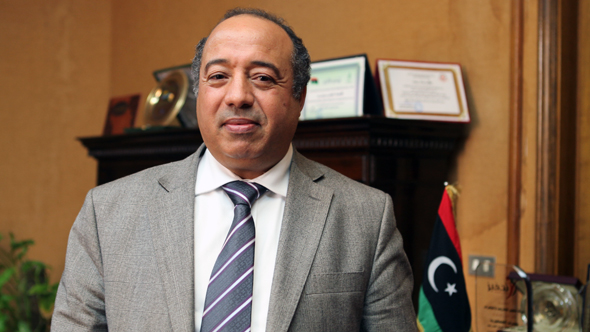
The International Monetary Fund Report stated that the central bank should make sure that the banks have sufficient capital to cover losses and continue lending during the reconstruction period. How is this actually being put in place? How are your balance sheets, what is the ratio of non-performing loans, the institutions that were active before the revolution, etc, and how is this contributing to the reconstruction taking place?
Jumhouria Bank is the largest bank in Libya and was the result of a merger between Al Ummah Bank and Jumhouria Bank. Now we have a total capital of about 1 billion Libyan dinar and total assets for 2012 of 33 billion Libyan dinar on the balance sheet and about 12 billion dinar off the balance sheet for a total of about 44 billion Libyan dinar.
Now we have a total capital of about 1 billion Libyan dinar and total assets for 2012 of 33 billion Libyan dinar on the balance sheet and about 12 billion dinar off the balance sheet for a total of about 44 billion Libyan dinar
For some loans that were already granted, either to the normal applicant or the public sector in the past, most of them, especially those granted to the public sector guaranteed by the Ministry of Finance and the banking sector in Libya, they have already received their money back. Just for some pending amounts which already should be resolved. For the social loans which were already granted to regular people based on their salary, they have guarantees for each social loan by two people which already includes a government employee and their salary, make sure they would come to the bank. So for social loans we don’t have any problems at all. For normal loans, we definitely had some loans before but especially for Jumhouria Bank the loans were fully provided by provisions and we don’t have problems at all.
The figures for 2010 were already released and the general assembly meeting. We generated a net profit and distributed 11% dividend to the shareholders.
Jumhouria Bank is the largest bank in Libya with a large volume of assets and good profits especially for the potential market in Libya. This is especially true in 2010 based on a lot of contracts that have already been signed by the government and international companies, especially for construction and the infrastructure of the country.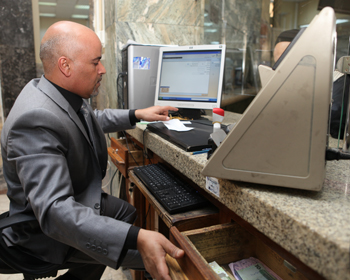
For Jumhouria Bank, we don’t have any problems at all. At the same time, despite 2012 being just the first year after the revolution, we generated a net profit of 240 million Libyan dinar, which makes about 24% of the capital.
Regarding the lending during this reconstruction period, are you providing loans for the reconstruction?
Many are lending or granting facilities to the contractors which have a contract with the government for construction. As you know, the budget has not been released yet but the government asked the contractors to continue their work. Even though the budget has not been released yet, there are many receivables and contractors need money so we as a bank provide these contractors with facilities and we try to extend and increase their facilities to at least enable them to continue their construction work until the budget has been released.
Then they will get more money and eventually the bank will generate some profit from the extension and increasing of financing for these contractors.
You don’t see lack of liquidity as a major issue for you?
There is no problem. We are a very liquid bank. We have 14 billion Libyan dinars just in promissory notes of the central bank. We are just getting 1% from the central bank and this money should be granted to the individual market at least to contribute to the building of the country for the future. We should especially think about investing our money in the private sector to let the private sector contribute to the structure of the country.
Why is the central bank having all this liquidity and not releasing it to the market?
We have some laws which should be reconsidered and amended by the general congress to enable us as a banking sector to contribute to the investment side. We need these changes to allow the banking sector to work freely with security. The money belongs to the people and we have to study properly where to invest the money. In particular, most of the money is short-term funding and some investments right now should be long-term funding. So we have to do our best.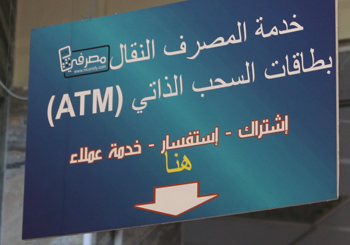
On one hand the government is saying the bank has to lend but on the other hand, the laws actually hinder the lending.
Some decisions should be made by the central bank as well, but on the other side, the problem is that many issues are pending – at the level of the government ministers. For example, the urban area – the Ministry of Finance should designate places where new houses can be build. We have to get the proper license from us or investors who would like to get the loans for building or the real estate in general.
But they need the proper license from each municipality to enable investors to come to the banks or the banks themselves can’t get these lands, at least to enable us to build it and sell it to the people, to contribute to arranging housing for people. The government should take some steps to prepare or finalize some decisions or laws, especially with the municipalities in the area, at least to prepare some lands with infrastructure and change it from rural to urban area to enable investors to build and construct there.
Regarding construction and privatization, before the revolution there were plans to privatize land. Some of the banks were privatized. Some of them, such as commercial banks and yourself, are still in the hands of the government. What do you feel is the future of privatization?
We have had bad experiences with privatization of banks in libya. Sahara Bank took 19% with the management with BNP Paribas but unfortunately there have been issues with both sides and it’s not working well. At the same time, Arab Bank took part of Wahda Bank and they have problems as well. If there’s a real partnership, it should be established properly. The banks should benefit from the experience of the international banks who take over a percentage of these banks but unfortunately what we noticed with Wahda Bank and Sahara Bank was a really bad experience. Regarding privatization, first of all, the central bank of Libya does not have international agreements with financial institutions and this is the first which the central bank of Libya should take offers in the near future.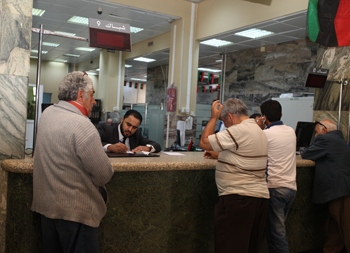
For Jumhouria Bank, in my opinion, this should be taken by the Ministry of Finance. Libya should have one government bank. But for the other banks, they should be put on the stock market and sold to the private sector gradually after they do their 2011 and 2012 financial reports and financial statements.
Some international company should probably do a proper valuation to determine the proper price for shares for the bank. Then it could be sold on the stock market here which would be much better. This can give opportunities even to international investors or local investors to take shares, thus improving the local stock market. It is not very active; there are currently only small shares from certain companies in Libya.
So if I understand correctly, you are for one bank being public and the others privatized but these privatizations shouldn’t be a sell-off or acquisition by foreign banks but should be listed on the stock exchange and shares purchased by Libyan people themselves?
Not just Libyan but also international investors. That doesn’t matter. Also for the small banks which are already established in the market, the central bank should issue a law that should require the minimum capital required for those banks which are now outside of the regulations of the central bank in my opinion.
Regarding infrastructure, banks are using different bank systems and infrastructure is still a big obstacle to proper banking. Can you talk about these challenges?
This is the major problem for the banking sector and not just the banking sector, but for the government itself and any company or ministry. Unfortunately we have a lack of proper communication in the country itself. I joined the bank just one year ago and unfortunately when I came here, most of the problems stemmed from the core banking system which caused problems on a daily basis. We also faced daily problems with our customers who think the failure was on our side, but unfortunately it is out of our control because it’s related to the poor communications system in Libya.
We have 150 branches and only 85 of them have been connected to the fiber or wireless system and the rest of the branches are not linked at all by the core banking system because they are in remote locations and there is no proper communication there. So we don’t have any options to connect to them with the core banking system. They are still running on very old systems, each bank separately and therefore there are problems with collecting information, especially to create a balance sheet on a monthly or daily basis.
I think now the government is working hard to provide fiber for all areas of the country itself and at the same time at least we should have two media communication. In case one doesn’t work then we will have the other for backup. At that time we will make sure that we have the proper services for our customers wherever they are.
What about the new electronic cheque clearing system that has been approved and is in process of being launched?
There’s a national payment system which has already been established at the central bank. It’s working now but not properly, especially if we don’t have all branches linked with the core banking system. We cannot link all branches with the clearing system so we have two different clearing systems, one that is electronic and the other manual which is to send the cheques to the clearing system.
So there are many problems due to communication but if we had better communication we would be finally able to do our best. Even now we have problems due to the lack of communication and also unfortunately the data center for four of the largest banks in Libya is already now in the central and with the same servers and operating system; therefore now the central bank is going to sublet the servers or the operating systems for the banks. Each one should be separated and we are working toward this.
Also, we would like proper servers with the proper operating system to connect between the servers and the core banking system. It’s finally in place and we expect it to be finalized within two months. When this is done, many problems will be solved within the banking sector. At the same time, we are working toward having our own data center in the bank. We want at least two, with one as the main and the other as a backup. I expect that before the end of 2013 and also with the communication system we will try to do our best to provide the proper services to our customers with the proper data center and core banking system.
In my opinion, there will be gradual growth. For Jumhouria, we expect 15% growth from year to year but for other banks I cannot answer. Profitability is growing but we are also trying to increase employee salaries.
We are also going to upgrade our version which we are working on right now. Unfortunately, we are working on the version 2.x while the ICE Cube already approached version number 12 so there is a big gap between our system which we are using right now and the final version which has been raised by the company. We try to do our best to upgrade the data for all of the banks after they are inter-linked by proper communication. At the same time we would like to go to the version 12 directly. We are in discussion with the company and the central bank right now because the main agreement has been signed by the central bank on behalf of the bankers so we expect by the end of this year everything will be solved for the core banking system. This will also serve for the clearing system or whatever to link to by the banks such as ATMs which can draw your money from a number of different banks. Right now you cannot withdraw money from any ATM, just from your own bank, but in the future you will be able to use any ATM.
Regarding international cooperation, when we were sitting with the privatization bureau they said it’s still difficult to transfer payments from local banks internationally. Can you tell us more about this?
There are no problems at all between the local banks and the international banks but there is a regulation from the central bank that limits transfers for each company and for individuals. It’s just a matter of control of the money from outside and from inside to outside. Really we are facing many problems. We also asked the central bank to delegate this to the banks themselves to know their customers and determine appropriate transfers.
We are facing many problems, especially for some false bills of collections. There is a bill of collection with a bill of lending but unfortunately there is no equipment or material shipped to the country. There are millions of those. This will affect our reserves. Some people from Libya have left the country and they have assets here and they can liquidate them and take the money outside the country. At the same time, some money may be used to get materials by paying cash. But definitely we have to control this money and prevent money laundering. So the central bank tries to control it but unfortunately some laws and regulations don’t differentiate between the law-abiding person who has real work, real investment or real importing of materials and the person who is just transferring the money and we don’t know where it’s going.
Unfortunately we have some countries that close their eyes to money laundering and they let the money come from here to their country. So we have to be careful about the money here in the banking sector. At the same time, the central bank issued a circular which affects the most important sectors like oil.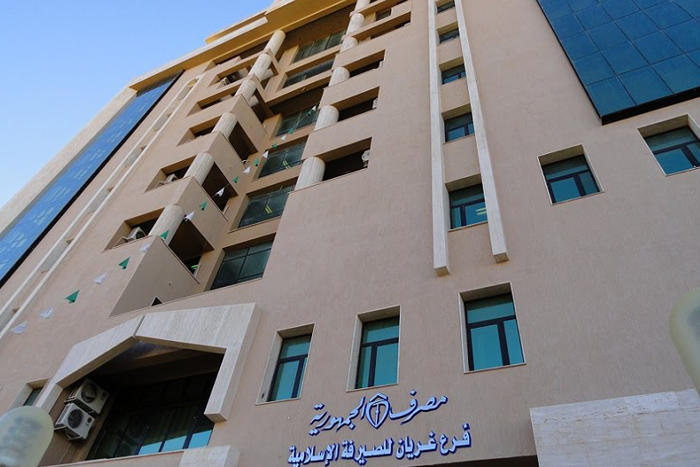
Oil is the main sector that generates money for the country. The oil companies in Libyaneed a lot of services and equipment which will then facilitate issues for them, also from the communication side. It is also important from the Ministry of Health side – the hospitals or medicine or equipment. The issue should also be facilitated for them. We are trying gradually to improve by discussing these issues with the central bank and trying to facilitate this gradually and introduce things gradually to soothe the regulations and increase transparency. The central bank should be able to serve the proper sectors without any problems but we cannot open everything because unfortunately the outflow is less than the cash flow from the outside.
Really to open this issue we should give trust to the people who are working outside to be able to transfer their money inside so they can collect their money immediately, exchange it to the Libyan dinar, and transfer it back. We have to create some trust between the banking sector and the people itself to enable a number of things in the banking sector here.
Do you know how many people are working in the banking sector?
About 20,000 people. In Jumhouria Bank we have about 7,000.
What is your prediction for the growth of the banking sector in 2013?
In my opinion, there will be gradual growth. For Jumhouria, we expect 15% growth YOY but for other banks I cannot answer. Profitability is growing but we are also trying to increase employee salaries. When I took over this bank, I tried to find out how the average salary compared to the other banking sectors here, especially the government banking sector. It should be at least equal or within 5 or 10%. Before I became the general manager of the bank, I insisted on increasing the salary of the staff by 14% to be equal to the public banking sector. This is a big amount – more than 70 million Libyan dinar.
At the same time, the central bank this year established a fund for the guarantee on the deposits of the banks to which we had to contribute. In 2012 they took 22 million Libyan dinar from Jumhouria Bank, so in addition to 70 million Libyan dinar for the increased salary, it came to 90 to 100 million Libyan dinar just for unexpected expenses. It’s not a small amount for a bank to increase from one year to the next. Also for 2013 this fund required about 34 million Libyan dinar from the bank.
The most important thing for the bank is the training of people. Unfortunately there was previously no investment in human resources at all so we must prepare our staff now. We are also facing a problem with the latest law issued by the general congress to cancel the interest for social loans for individuals. So we have to think about alternate services to compensate for this profit loss.